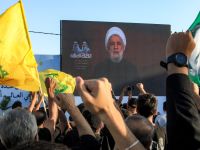The Israeli army believes it will have to spend five more years putting down the latest Palestinian uprising against 34 years of military occupation, and that the whole region could eventually be engulfed in war, Haaretz newspaper reported on Thursday, citing a report being finalized by the general staff.
In its annual strategic assessment, the occupation army added that the conflict could deteriorate into a regional war, “either as a result of escalation of the violence with the Palestinians or because of a confrontation in the north with Hizbollah and Syria.”
The assessment, based in part on military intelligence assessments, also states that Palestinian President Yasser Arafat can at most reach an agreement with Israel for a lull in the fighting, but even that is not likely, “since Arafat believes that time is on the Palestinians' side.”
Furthermore, Arafat's domestic position in the face of the Hamas and other radical forces is likely to worsen, up to complete loss of control on his part, according to the assessment.
The Israeli army's use of hi-tech weapons such as attack helicopters against Palestinians, whose severely limited arsenal consists mainly of small arms, has created a roughly 4:1 kill ratio.
In eleven months, the Israelis have killed 547 Palestinians, according to AFP, while suffering 146 losses.
In the period leading up to 2006, Israeli forces could therefore,at this rate, be expected to kill at least 2,000 more Palestinians.
The two "fronts" - the Israeli-Palestinian and the northern one - are "stable but fragile," with internal balances, because both sides are careful not to shatter them, the assessment says. Nonetheless, any serious incident, particularly a major "terror" attack, could send either front into war.
The assessment, however, does not say that the Intifada will end by 2006.
According to Haaretz, the assessment's purpose is not to predict developments, but rather to describe the threats that comprise the basis for how the army will be prepared throughout a five-years plan that ends by then.
Another assessment, put together by the Israeli army operations directorate, draws on both the general staff and military intelligence assessments to formulate the army operational plans for the problems it will face in the coming year.
The paper said that Chief of Staff Shaul Mofaz had yet to summarize the strategic situation that would be presented to the defense minister and the ministerial committee on defense.
According to the planning directorate, traditional military threats, like a surprise pan-Arab attack such as happened in 1973, have been reduced. However, a new kind of limited threat, typified by the Palestinians and Hizbollah, could still lead Israel and its neighbors into war.
These developments, say the general staff planners, are not necessarily predestined, and Israel's behavior can influence their fruition. Between the two poles - full-scale war or complete calm - the planning directorate tends to believe a third way is most likely: a continuation of the current situation, but with the gradual addition of "escalatory" elements - more severe means, new targets, greater numbers of casualties, says the report.
Neither extreme case - total Israeli surrender to Palestinian demands for freedom, or an initiated escalation leading to chaos on the Palestinian side and military intervention by "regional elements" - is regarded as a realistic estimate. Instead, the policy established at the start of the conflict, attrition, will continue.
Another alternative, a unilateral separation, is possible, but is not on the current government's agenda.
The plan was being promoted by the former Israel government headed by Ehud Barak, who wanted full separation between Israel and the Palestinian lands.
An offensive attack by Iran or Iraq and possible changes in the regimes in Egypt and Jordan are not considered likely factors that could lead toward war by 2006.
Despite hardline rhetoric exchanged between Egypt and Israel, and mounting anti-Israeli sentiments in Jordan that put pressure on the kingdom, Israelis belive that both Cairo and Amman will respect the peace treaties signed with the Jewish state in 1979 and 1994, respectively.
According to the planning directorate, meanwhile, Arafat will remain the main pillar of the functioning of the Palestinian establishment. The Palestinian Authority will not collapse, and Arafat will not lose his control over it. Nonetheless, his ability to make decisions and implement them will weaken as a result of growing power in the hands of “the radical forces.”
Arafat, his aides and Palestinian opposition leaders have repeatedly said that the Intifada on the one hand and the escalated Israeli military attacks against Palestinians had unified the Palestinians in one front.
After an F-16 attack in retaliation for a suicide bombing in west Jerusalem, Arafat said that such Israeli attacks “render the Palestinians stronger.”
The Palestinians and Israel both lost some of the international credibility they had attained before September 2000, when the Intifada broke out, without either side gaining from the other's loss, the assessment said.
It also predicted that the political effort would continue along the lines of the Mitchell Report and the Tenet cease-fire deal, but Arafat would try to improve his situation by skipping a ceasefire and putting the burden of the first move - a settlement freeze - on Israel, as well as by bringing in international observers as a first, symbolic step toward moving responsibility for the crisis to the international community.
He has failed so far to win important political support in the Bush administration, but he is trying to bring about the collapse of the national unity government headed by Sharon.
A conflict between Sharon and Labor ministers in his cabinet, notably Foreign Minister Shimon Peres, has been in the headlines frequently, but Sharon has so far escaped a possible resignation of Peres that would undermine his government – Albawaba.com
© 2001 Al Bawaba (www.albawaba.com)







